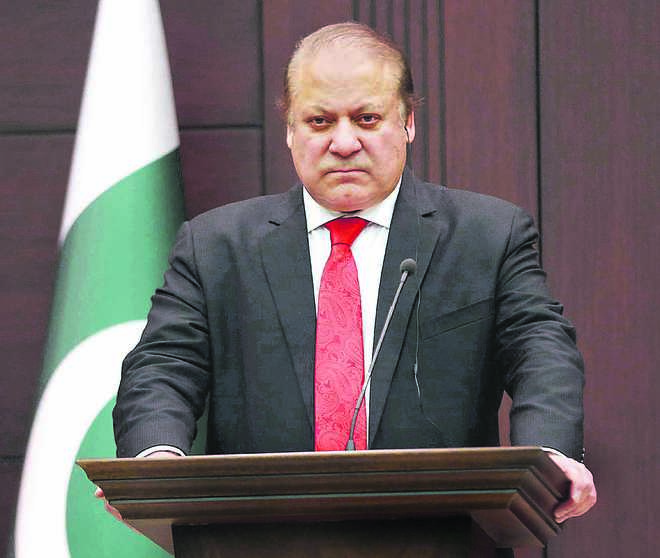
Endgame? The Pakistan army chief is determined to see Nawaz Sharif’s ouster.
FOLLOWING the visit of Home Minister Rajnath Singh to Islamabad, the time has come for a dispassionate analysis of where we stand, as we prepare for a scheduled visit by Prime Minister Narendra Modi to Islamabad in November, for the SAARC Summit. We need to understand the dynamics of internal developments in Pakistan and its foreign policy imperatives. I had occasion to meet well-informed Pakistani politicians, former diplomats, academics and retired generals in recent days. Pakistan is going through difficult political times. It is being shunned and distrusted by the US and its Western allies; regarded as an untrustworthy country by Gulf Arabs and Iranians alike; and reviled by neighbours Bangladesh, Afghanistan and India for sponsoring terrorism. Its sole “friends” appear to be China and Turkey, which is just recovering from a coup. Pakistan is finding scant international support for its territorial claims in J&K. It is facing a hostile reaction from Afghanistan for its efforts to fence the Durand Line, which no Afghan and many Pakistani Pashtuns do not recognise as international border. There have been escalating tensions and clashes along the Pak-Afghan border, as Pakistan tries to regulate cross-border movement by constructing a gate at the Torkham border. It is evident that its army chief, Gen Raheel Sharif, who is due to retire on November 30 and evidently looks forward to an extension, loathes PM Nawaz Sharif and seems determined to get him ousted for the involvement of his sons and daughter in the Panama bank accounts scandal. Raheel Sharif, whose uncle and brother were killed in the 1965 and 1971 conflicts, detests India. He has acted independent of the government and parliament in conducting military operations in the Khyber Pakhtunkhwa Province bordering Afghanistan, apart from continuing massacres and illegal abductions in Baluchistan.It is in these circumstances that the killing of terrorist Burhan Wani has led to both the army and Nawaz virtually competing with each other in raising domestic passions by embarking on a propaganda barrage against India. Home Minister Rajnath Singh’s counterpart Chaudhry Nisar Ali Khan, who has his eyes on Nawaz’s job with army backing, was hardly likely to miss the opportunity to appear more hostile than his boss, Nawaz, during the SAARC meeting. Moreover, anti-India rallies were organised by the likes of Hafiz Saeed, across Pakistan’s capital. Mr Rajnath Singh made a blunt presentation about Pakistan’s role as a state sponsor of terrorism and narcotics smuggling. These were, in any case, the main subjects on the agenda. Mr Rajnath Singh was also careful in not violating any SAARC convention. He did not name Pakistan in his speech. Given the present political climate in Pakistan and the ongoing power struggle between Nawaz and Raheel Sharif, Pakistan will continue with this charade, till the situation in the Valley becomes normal. The Americans have already called on Pakistan to end its support to terrorist groups operating from its soil, in India and Afghanistan. British columnist Owen Bennett Jones has tendered similar advice in the highly respected Karachi-based Dawn newspaper. But, underlying all this, I sensed from comments by Pakistani friends that their much-touted Zarb-e-Azb military operations have not only displaced 1.8 million Pashtun tribals from their homes, but some 40,000 tribals have fled into Afghanistan. Many of them are preparing for retribution across the Afghanistan-Pakistan border. There are, predictably, allegations that intelligence agencies of India and Afghanistan are hand in glove in fomenting violence in Pakistan.It is clear that we should be prepared for a continuing propaganda barrage from Pakistan. We, in turn, should prepare for a well-planned diplomatic and political offensive against Pakistani military actions, excesses and rights violations during army operations in Baluchistan, the tribal areas of Pakhtunkhwa and on the hapless Mohajirs of Karachi. The Mohajirs, after all, migrated from India and still have familial and other ties with relatives and friends in India. It also needs to be noted that Pakistan’s annexation of Baluchistan after the Partition was effected by duplicity, deceit and military force. Baluchistan’s ruler, the then Khan of Kalat, refused to accede to Pakistan. His successor also holds that Pakistanis are in illegal occupation of the province. The people of Baluchistan have waged armed struggles against the Pakistan State since 1948. In the most recent and ongoing military conflict since 2003, thousands of Baluch freedom fighters have been killed and an estimated 15,000 people are missing. The army has defied orders of Pakistan’s supreme court to produce those illegally abducted by it. Baluch grievances are not only political, but also driven by exploitation of their natural resources and denial of equitable employment and other opportunities by the ruling Punjabi elite.New Delhi also needs to review its approach to dealing with militancy in the Kashmir valley. While successive governments in Srinagar keep demanding more and more money for projects, especially after floods, there has to be much more accountability on how these funds are spent. While it is good to keep channels of communications open across a wide cross section of society, to convey genuine interest in addressing their grievances, it would be unrealistic to expect anything positive from any high-profile engagement with the Hurriyat. Two Kashmiri Hurriyat leaders went against the wishes of Pakistan and its proxies — Mirwaiz Mohammad Farooq and Abdul Ghani Lone. Pakistan-sponsored terrorists killed both of them. One doubts if the present Hurriyat leaders will, in these circumstances, show the courage to question what Pakistan orders them. But a carefully calibrated process of engagement with a wide cross section of society in J&K is imperative, with enough political space being given to the Chief Minister to act credibly. Lastly, the security forces need to carefully review their tactics and imaginatively use minimal force necessary to deal with any situation. We are in for a long haul in the Kashmir valley.

